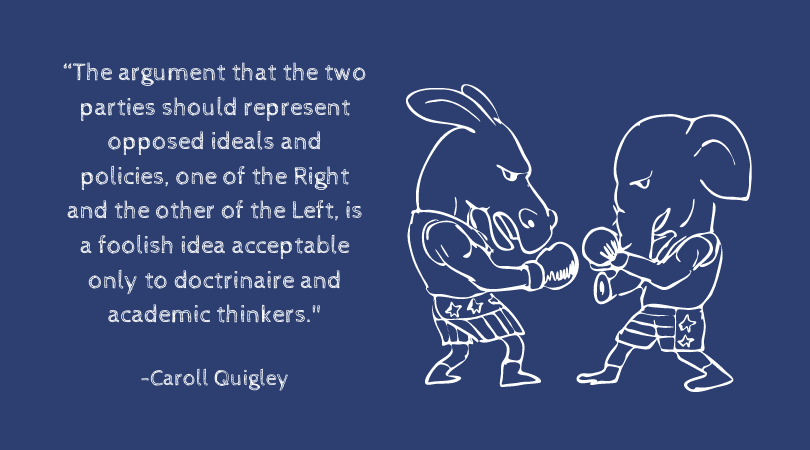These books are part of the reason that I stopped looking at politics in partisan terms. (The other reason is that I've worked to develop a more Socratic temperament where I try to look at the other side(s) of any argument.)
A partisan perspective is actually a severe handicap when it comes to examining politics, because partisanship creates a false dichotomy where we tend to ignore alternative or conflicting information. When we think that "This is my party/preferred media outlet and I agree with what they do and say," this mindset compels us to just scratch the surface of what is really going on.
If we want a real understanding of politics, we need to dig deeper, and that's where this list comes in. Here are the best 5 books to read for a deeper understanding of politics:
1. Political Parties - Robert Michels
This incredible work, one of the classics of sociology and political science, is just as mind-blowing today as when it was first published a century ago. The book positively begs us to examine the maxim that power corrupts, and explains why governments always tend to become corrupt over time.
Oligarchy is defined as rule by an elite or privileged few. Today people often use the word oligarchy to refer to a leadership class of corporate plutocrats, but what is less understood is how oligarchies form. Oligarchy is rule by a few to be sure. However, the concept of oligarchy in Michels' lexicon - the “Iron Law of Oligarchy,” - is both an explanation for how oligarchies originate, as well as a compelling critique of the inherently flawed structure of government itself.
It should be understood that Michels considers oligarchy an “Iron Law,” because it is the direct result of bureaucracy that all governments and formal organizations need in order to function in the first place. Michels is quite clear that the law applies not just to political parties, but to all formal, complex organizations, including trade unions, clubs, activist groups, professional associations, corporations, government and so on. Even in what starts out as the most democratic or egalitarian movements and organizations, an undemocratic leadership class eventually emerges to control administration, knowledge, strategy, and finance.
Once in power, it is very difficult to get rid of oligarchical leaders. The rank and file cannot easily compete with an entrenched ruling elite. Leaders are better organized and have more access to fiances and information than the rank and file, who are at a distinct disadvantage. This is historically why many reforms were unsuccessful and change came in the form of bloody revolution, only to start the cycle of new leadership and new oligarchy all over again.
2. Tragedy and Hope: A History of the World in Our Time - Carol Quigley
Quigley taught that history is often more than a series of random events. Building on the concept of oligarchy discussed above, in his 1964 work, Tragedy and Hope: A History of the World in Our Time, Quigley wrote that as far back as the 19th Century, industrial capitalism and banking has made it possible for powerful oligarchies to form in the West.
These Oligarchs have played an important role mostly behind the scenes in world political history, which he went on to document extensively in a subsequent book, The Anglo-American Establishment, published in 1981.
Quigley also argued in Tragedy and Hope that in America, the two political parties aren't really all that different, which reduces the efficacy of voting and allows the oligarchs to maintain control:
“The argument that the two parties should represent opposed ideals and policies, one, perhaps, of the Right and the other of the Left, is a foolish idea acceptable only to doctrinaire and academic thinkers. Instead, the two parties should be almost identical, so that the American people can “throw the rascals out” at any election without leading to any profound or extensive shifts in policy.”
At 1300 pages, this is a dense read. If you would rather not read a book of this length, Joe Plummer has written a shorter summary, Tragedy and Hope 101, which you can buy from Amazon and read in about 5 hours. There is also an audio book version of 101 on YouTube. Plummer's summary will give you a more complete understanding of history and politics without having to read the full 1300 pages of Tragedy and Hope, although the original book is a worthwhile read if you are so inclined to tackle it.
3. Propaganda - Edward Bernays
Edward Bernays is considered the father of propaganda and public relations, titles that he did not mind. The nephew of Sigmond Freud, Bernays was was an Austrian-American consultant in the then new field of public relations in the mid-Twentieth Century.
Building on Freud's ideas, Bernays combined social science and psychological manipulation techniques to create a sophisticated framework for influencing both public communication and encouraging consumerism. He also used what he called "psychological warfare," to build support for World War II. Some of Bernays' innovations are now commonplace today, such as the organization of think tanks to lend real or perceived legitimacy to some political cause.
Bernays is most well known for his 1928 book Propaganda. He thought that propaganda was both necessary and admirable in democratic societies. (This is in contrast to Jaques Ellul, who I've written about extensively, who thought that while propaganda is necessary for democracies to function, it is by no means harmelss.)
In his book Propaganda, Bernays states:
“The conscious and intelligent manipulation of the organised habits and opinions of the masses is an important element in democratic society…We are governed, our minds moulded, our tastes formed, our ideas suggested, largely by men we have never heard of. This is the logical result of the way in which our democratic society is organised.”
He continues:
In almost every act of our daily lives, whether in the sphere of politics or business, in our social conduct or our ethical thinking, we are dominated by the relatively small number of persons... who understand the mental processes and social patterns of the masses.
Propaganda is a book that will certainly make us look at politics differently and I hope will also encourage us to be more careful when forming our opinions. You may also want to check out my video on resisting propaganda based on Jaques Ellul's scholarship on propaganda.
4. Fire In the Minds of Men: Origins of Revolutionary Faith - James H. Billington
In 1980, Billington published Fire in the Minds of Men: Origins of Revolutionary Faith. The book is essentially about how ideas spread, in particilar, modern revolutionary ideas.
Billington argues that the term revolutionary is overused (to describe 1960s hippies for example), and the idea or revolution itself is painted in too positive a light. While he is interested in revolutionaries as the creators of new traditions, he does disabuse the reader of any romantic notions about modern revolution. He writes:
"Modern revolutionaries are believers, no less committed and intense than were the Christians or Muslims of an earlier era. What is new is the belief that a perfect secular order will emerge from the forcible overthrow of traditional authority. This inherently implausible idea gave dynamism to Europe in the nineteenth century, and has become the most successful ideological export of the West to the world in the twentieth."
Billington argues that successful revolutionaries always come from the elite classes or the intelligentsia, contrary to what Marx theorized about a revolution for the working class:
"The characteristic, nineteenth-century European revolutionary: a thinker lifted up by ideas, not a worker or peasant bent down by toil. He was part of a small elite whose story must be told “from above,” much as it may displease those who believe that history in general (and revolutionary history in particular) is basically made by socio-economic pressures “from below.” This “elite” focus does not imply indifference to the mass, human suffering which underlay the era of this narrative. It reflects only the special need to concentrate here on the spiritual thirst of those who think rather than on the material hunger of those who work. For it was passionate intellectuals who created and developed the revolutionary faith."
Fire in the Minds of Men is an important book that will change how you look at revolutions and the spread of ideas is society.
5. War is A Racket - Gen. Smedley Butler
Butler's moral courage was a match for his physical courage. When he retired from the military, he took the unusual step of pointing out that war is a racketeering scheme in his 1935 book, War is a Racket. What did he mean by this? He meant that moneyed interests on both sides often profit from war. Sometimes those interests even finance both sides in order to foment wars in the first place. Bulter argues that:
"War is a racket. It always has been. It is possibly the oldest, easily the most profitable, surely the most vicious. It is the only one international in scope. It is the only one in which the profits are reckoned in dollars and the losses in lives. A racket is best described, I believe, as something that is not what it seems to the majority of the people. Only a small 'inside' group knows what it is about. It is conducted for the benefit of the very few, at the expense of the very many. Out of war a few people make huge fortunes."
Bulter wrote that he had never thought on his own before leaving the military. But looking back on his career, truthfulness compelled him to speak. He writes:
I helped make Mexico, especially Tampico, safe for American oil interests in 1914. I helped make Haiti and Cuba a decent place for the National City Bank boys to collect revenues in. I helped in the raping of half a dozen Central American republics for the benefits of Wall Street. The record of racketeering is long. I helped purify Nicaragua for the international banking house of Brown Brothers in 1909-1912 (where have I heard that name before?). I brought light to the Dominican Republic for American sugar interests in 1916. In China I helped to see to it that Standard Oil went its way unmolested.
During those years, I had, as the boys in the back room would say, a swell racket. Looking back on it, I feel that I could have given Al Capone a few hints. The best he could do was to operate his racket in three districts. I operated on three continents.
Bulter thought that in order to prevent oligarchs from profiteering off of brutal wars where many people die, war should be limited to the defense of our homes or to defend the Bill of Rights.
This is an important work that forces us to examine whether things have really changed in the last 100 years. I would argue that they have not. War is a Racket is a short and straightforward read that I highly recommend if you want a better understanding of international affairs.
I hope that the books on this list will give you a better understanding of politics and history.
*This post contains Amazon affliate links.
~
Read Next:
How the Left/Right Political Spectrum Deceives Us
Are You a Disordered Philosopher?
Would You Risk Your Life For Philosophy?











